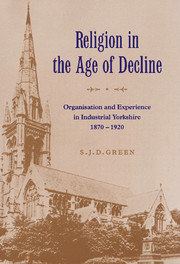Book contents
- Frontmatter
- Contents
- Acknowledgements
- List of tables
- List of abbreviations
- Introduction
- Part I Providing the means
- Part II Drawing in the people
- Part III The trials of the religious life
- 7 Worship exalted and experience eclipsed: liturgical orderliness, dutiful observance and the making of a modern Christian witness
- 8 Christianity within and beyond the churches: the pattern of the devotion and the authenticity of expression
- 9 The forward march of the Christian churches halted? Organisational stasis and the crisis of the associational ideal in early twentieth-century religious institutions
- Conclusion
- Bibliography
- Index
7 - Worship exalted and experience eclipsed: liturgical orderliness, dutiful observance and the making of a modern Christian witness
from Part III - The trials of the religious life
Published online by Cambridge University Press: 08 October 2009
- Frontmatter
- Contents
- Acknowledgements
- List of tables
- List of abbreviations
- Introduction
- Part I Providing the means
- Part II Drawing in the people
- Part III The trials of the religious life
- 7 Worship exalted and experience eclipsed: liturgical orderliness, dutiful observance and the making of a modern Christian witness
- 8 Christianity within and beyond the churches: the pattern of the devotion and the authenticity of expression
- 9 The forward march of the Christian churches halted? Organisational stasis and the crisis of the associational ideal in early twentieth-century religious institutions
- Conclusion
- Bibliography
- Index
Summary
Introduction: notes towards a converging system of faiths
Addressing the annual church meeting of Northgate End Unitarian Chapel, Halifax, in 1893, the Reverend F.E. Millson, long-time Pastor of that Society, made the following observation: ‘[T]here is less need for us to build new chapels because we, in our teaching, are getting close to yours [i.e. to other denominations] and … the principles … which we have taught are now accepted as true by most, if not all, of the religious leaders of Halifax.’ This had certainly not always been the case: ‘When I came here [in 1870],’ he recalled, ‘I found this congregation professing a belief that all men are the children of God, and [in] no sense children of the devil, and relying on reasonable enquiry and common experience as the tests to which all religious teaching should submit itself’. And ‘these principles [were] fiercely attacked in the interest of the doctrines of the fallen nature of man, the need of an atoning sacrifice, and the final authority of the Bible as a divine revelation’. However, such ‘doctrines’, though ‘[still] enshrined in the Trust Deeds of Halifax churches’, he assured his listeners, ‘are seldom preached from their pulpits now’. As a result, ‘we [i.e. Unitarians] can go into Independent and Baptist and Wesleyan chapels without much risk of hearing a word about doctrines from which we would dissent’.
- Type
- Chapter
- Information
- Religion in the Age of DeclineOrganisation and Experience in Industrial Yorkshire, 1870–1920, pp. 293 - 324Publisher: Cambridge University PressPrint publication year: 1996



